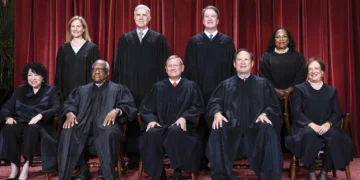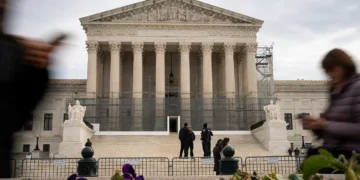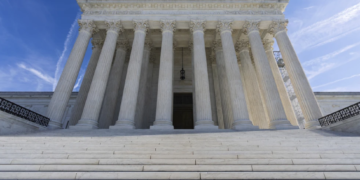Mississippi State Capitol Building (Chuck Kelly/Flickr)
Jul 3, 2024 Story by: Editor
A federal court has mandated the redrawing of several legislative districts in Mississippi due to the dilution of Black voting power.
On Tuesday evening, the United States Court for the Southern District of Mississippi ruled in favor of the NAACP’s state conference against the Mississippi Election Commission, concluding that the state violated Section 2 of the U.S. Voting Rights Act by redistricting legislative boundaries in 2022.
“The court rightly held that the Mississippi Legislature used the redistricting process to dilute the power of Black voters,” stated Jarvis Dortch, Mississippi ACLU Executive Director. “Those legislative districts denied Black Mississippians an equal voice in state government.”
These violations led to a loss of Black voting strength, prompting the court to order the creation of a new Black-majority Senate district around DeSoto County and Hattiesburg, as well as a new Black-majority House district in Chickasaw and Monroe counties. The court expects these changes before the 2025 legislative session begins in January.
“It is the desire of this court to have new legislators elected before the 2025 legislative session convenes, but the parties can make whatever arguments about timing they conclude are valid,” the ruling states.
Legislative redistricting, which occurs every 10 years following the federal census, was approved by lawmakers in 2022. In their 2022 lawsuit, NAACP representatives argued that Black voters were concentrated into certain districts, diminishing their overall voting power.
Mississippi has a Black population of about 38%. As of 2024, there are 42 Black-majority districts in the 122-member House (34.4%) and 15 Black-majority districts in the 52-member Senate (28.8%).
The Mississippi Election Commission, composed of Republicans Gov. Tate Reeves, Attorney General Lynn Fitch, and Secretary of State Michael Watson, may appeal the ruling to the U.S. Supreme Court, begin the process of electing new lawmakers, or request more time.
If the commission decides to adjust the map for majority Black districts, Reeves would need to call a special session for lawmakers to finalize the new district plan and then hold a special election.
Maryasa Lee, spokesperson for the Attorney General’s Office, said they were still reviewing the court’s decision as of 11:30 a.m. Wednesday. Cory Custer, Reeves’ deputy chief of staff, did not respond to requests for comment by 1 p.m. Wednesday. Elizabeth Jonson, Communications Director for Watson, said the MSOS had received the 119-page decision and is also still reviewing it. “We will discuss with counsel soon and chart a path forward,” she added.
Leah Smith, Lt. Gov. Delbert Hosemann’s deputy chief of staff, did not respond to requests for comment by 1 p.m. Wednesday. Taylor Spillman, Communications Director for House Speaker Jason White, said White’s team is still reviewing the decision.
While the three-judge panel agreed with the NAACP, not all of the plaintiffs’ claims were upheld.
“The Mississippi State Conference NAACP is pleased with the decision of finding some of the districts discriminatory to Black voters, although we wish the court had gone further,” saidd States Court for the Southern District of Mississippi ruled in favor of the NAACP’s state conference against the Mississippi Election Commission, concluding that the state violated Section 2 of the U.S. Voting Rights Act by redistricting legislative boundaries in 2022.
“The court rightly held that the Mississippi Legislature used the redistricting process to dilute the power of Black voters,” stated Jarvis Dortch, Mississippi ACLU Executive Director. “Those legislative districts denied Black Mississippians an equal voice in state government.”
These violations led to a loss of Black voting strength, prompting the court to order the creation of a new Black-majority Senate district around DeSoto County and Hattiesburg, as well as a new Black-majority House district in Chickasaw and Monroe counties. The court expects these changes before the 2025 legislative session begins in January.
“It is the desire of this court to have new legislators elected before the 2025 legislative session convenes, but the parties can make whatever arguments about timing they conclude are valid,” the ruling states.
Legislative redistricting, which occurs every 10 years following the federal census, was approved by lawmakers in 2022. In their 2022 lawsuit, NAACP representatives argued that Black voters were concentrated into certain districts, diminishing their overall voting power.
Mississippi has a Black population of about 38%. As of 2024, there are 42 Black-majority districts in the 122-member House (34.4%) and 15 Black-majority districts in the 52-member Senate (28.8%).
The Mississippi Election Commission, composed of Republicans Gov. Tate Reeves, Attorney General Lynn Fitch, and Secretary of State Michael Watson, may appeal the ruling to the U.S. Supreme Court, begin the process of electing new lawmakers, or request more time.
If the commission decides to adjust the map for majority Black districts, Reeves would need to call a special session for lawmakers to finalize the new district plan and then hold a special election.
Maryasa Lee, spokesperson for the Attorney General’s Office, said they were still reviewing the court’s decision as of 11:30 a.m. Wednesday. Cory Custer, Reeves’ deputy chief of staff, did not respond to requests for comment by 1 p.m. Wednesday. Elizabeth Jonson, Communications Director for Watson, said the MSOS had received the 119-page decision and is also still reviewing it. “We will discuss with counsel soon and chart a path forward,” she added.
Leah Smith, Lt. Gov. Delbert Hosemann’s deputy chief of staff, did not respond to requests for comment by 1 p.m. Wednesday. Taylor Spillman, Communications Director for House Speaker Jason White, said White’s team is still reviewing the decision.
While the three-judge panel agreed with the NAACP, not all of the plaintiffs’ claims were upheld.
“The Mississippi State Conference NAACP is pleased with the decision of finding some of the districts discriminatory to Black voters, although we wish the court had gone further,” said Charles V. Taylor, Jr., executive director of the Mississippi State Conference NAACP. Source: Clarion Ledger
















